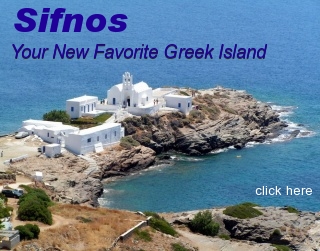|
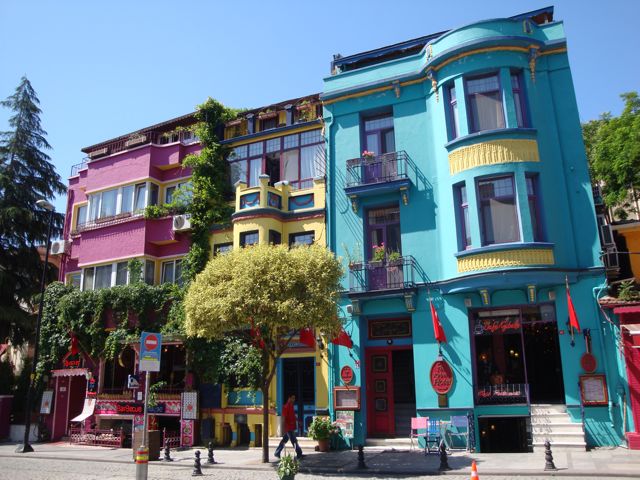 Sunday morning is a great time to walk around
Istanbul because everyone who has a car is probably asleep and the
usually crowded streets are empty. This past Sunday Andrea and I woke up early and
had breakfast and coffee at the Hotel Neorion where we stay and just walked out the door
in the general direction of the Grand Bazaar. Yes, I was aware the
the Grand Bazaar is closed on Sunday but outside of it there is a
street market or flea market which is between the bazaar and
Beyazit Tower that sounded interesting, to Andrea at least since I am not much of a shopper. But it seemed like an OK thing to do and I certainly could use the exercise. From the Hotel Neorion we
just walked uphill and southeast and ended up at Sultanhamet
Square between Agia Sophia and the Blue Mosque where there were
already crowds gathering. On the way there we stopped at the Cagaloglu Hamam, featured in Patricia Schultz's 1000 Places to See Before You Die and located at Kazim Ismail Gürkan Cad. 34 which was pretty much empty on Sunday morning so we made a mental note to return for a bath but of course never did since our hotel has a hamam in the basement and there is only so clean you can get. We followed the tram line west on Divan
Yolu Cadessi, and passed a few tourists going towards the important
sites and stopped at the Sultanhamet Hamam where we met an African guy named Joseph who showed us around and told us he had just received his visa and tickets to move to the USA to be reuinited with his family from Sudan. He seemed very pleased about it but had few complaints about the years he spent waiting to leave Istanbul. We also stopped at the famous Pudding Shop which on the sixties and early seventies was where all the cool westerners hung out, sort of the way Papaspiros in Syntagma Square
used to be in Athens. Sunday morning is a great time to walk around
Istanbul because everyone who has a car is probably asleep and the
usually crowded streets are empty. This past Sunday Andrea and I woke up early and
had breakfast and coffee at the Hotel Neorion where we stay and just walked out the door
in the general direction of the Grand Bazaar. Yes, I was aware the
the Grand Bazaar is closed on Sunday but outside of it there is a
street market or flea market which is between the bazaar and
Beyazit Tower that sounded interesting, to Andrea at least since I am not much of a shopper. But it seemed like an OK thing to do and I certainly could use the exercise. From the Hotel Neorion we
just walked uphill and southeast and ended up at Sultanhamet
Square between Agia Sophia and the Blue Mosque where there were
already crowds gathering. On the way there we stopped at the Cagaloglu Hamam, featured in Patricia Schultz's 1000 Places to See Before You Die and located at Kazim Ismail Gürkan Cad. 34 which was pretty much empty on Sunday morning so we made a mental note to return for a bath but of course never did since our hotel has a hamam in the basement and there is only so clean you can get. We followed the tram line west on Divan
Yolu Cadessi, and passed a few tourists going towards the important
sites and stopped at the Sultanhamet Hamam where we met an African guy named Joseph who showed us around and told us he had just received his visa and tickets to move to the USA to be reuinited with his family from Sudan. He seemed very pleased about it but had few complaints about the years he spent waiting to leave Istanbul. We also stopped at the famous Pudding Shop which on the sixties and early seventies was where all the cool westerners hung out, sort of the way Papaspiros in Syntagma Square
used to be in Athens.
|
|
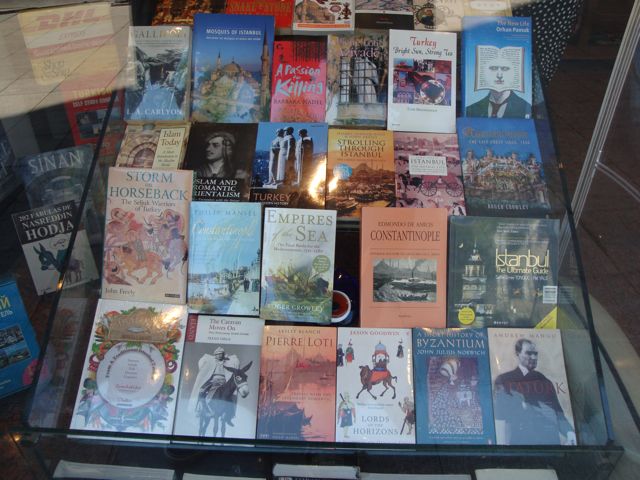 Just beyond the Firuz Aga Mosque and the German Fountain
there are a couple good English language bookshops owned by the
same people, one on each side of the street to make sure nobody
misses them. They are hard to miss since they have given
themselves the generic name of BOOK SHOP and they have a large
glass window displaying books. Though their stock was redundant,
you would see the same books in differents sections of the store,
their collection of Turkish travel guides, Turkish art books,
books by Turkish writers and foreigners living in Turkey like John
Freely was excellent. Freely who apparently visits the shop has called it "the most elegant bookshop I have ever
seen". Of course if you are coming from the USA,
particularly a university town, you won't be that impressed by its
elegance. It just looks like a really nice bookshop. But unlike
Robinson Crusoe Bookshop on Istikial Avenue in Beyoglu which is
the classic book lover's bookshop with shelves packed full of
books, that reach the ceiling, crammed into a very small
space,(really similar to Sheakespeare and Sons in Paris) the Book Shop has a generous amount of room and you are not overwhelmed by
the task of reading every title on the binder until you find one
you like. Books are sensibly displayed face forward and the whole
place feels comfortable. There are comfortable chairs and you can
browse and hang out all day if you like, at least that is what the
owners say. They also hope to expand to London, New York and Paris
and to be a window on Turkey for the rest of the world. But if you
come to Turkey and need a guidebook or want to read the latest
Orhan Pamuk or some of the other Turkish writers, current or
historical, or any books on Turkish history, culture or even a
Turkish phrase book, this is a good place to visit at the
beginning of your trip and also at the end. They have a website at
www.bookshopistanbul.com of course. Just beyond the Firuz Aga Mosque and the German Fountain
there are a couple good English language bookshops owned by the
same people, one on each side of the street to make sure nobody
misses them. They are hard to miss since they have given
themselves the generic name of BOOK SHOP and they have a large
glass window displaying books. Though their stock was redundant,
you would see the same books in differents sections of the store,
their collection of Turkish travel guides, Turkish art books,
books by Turkish writers and foreigners living in Turkey like John
Freely was excellent. Freely who apparently visits the shop has called it "the most elegant bookshop I have ever
seen". Of course if you are coming from the USA,
particularly a university town, you won't be that impressed by its
elegance. It just looks like a really nice bookshop. But unlike
Robinson Crusoe Bookshop on Istikial Avenue in Beyoglu which is
the classic book lover's bookshop with shelves packed full of
books, that reach the ceiling, crammed into a very small
space,(really similar to Sheakespeare and Sons in Paris) the Book Shop has a generous amount of room and you are not overwhelmed by
the task of reading every title on the binder until you find one
you like. Books are sensibly displayed face forward and the whole
place feels comfortable. There are comfortable chairs and you can
browse and hang out all day if you like, at least that is what the
owners say. They also hope to expand to London, New York and Paris
and to be a window on Turkey for the rest of the world. But if you
come to Turkey and need a guidebook or want to read the latest
Orhan Pamuk or some of the other Turkish writers, current or
historical, or any books on Turkish history, culture or even a
Turkish phrase book, this is a good place to visit at the
beginning of your trip and also at the end. They have a website at
www.bookshopistanbul.com of course.
|
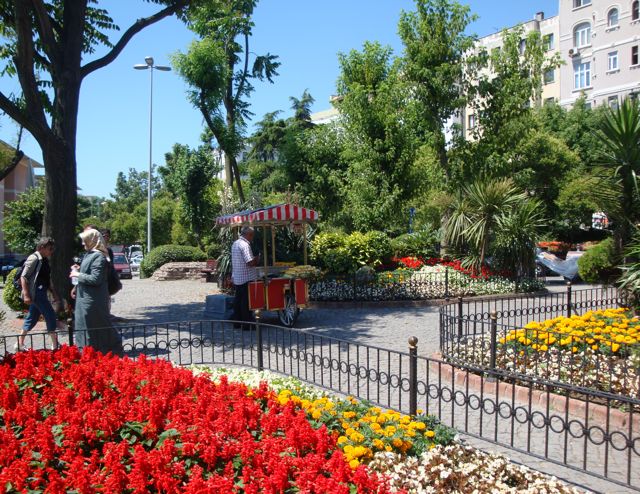 However since we had our totally outdated Lonely Planet in the
hotel room and were at the beginning of a long day of walking, we
left without buying anything, telling the girl at the desk that we
would return. We didn't. But we meant to. That is one of the
problems with Istanbul. There are too many places that you stop in
and want to spend more time in but you can't because your time is
so limited. You would have to spend a couple weeks here just to
see the important historical and cultural sites and most people
have to cram them into three or four days. Of course you can take
the attitude that if you see one mosque you have seen them all and
then once you have visited the Blue Mosque, you can cross the
other 2,994 mosques off of your things-to-do list which will open
up a lot of time for you. Or limit yourself to two museums instead
of the forty or more scattered around the city. Or you can tell
yourself that you will only spend a couple hours at the Grand
Bazaar instead of spending all day there, and the next, and the
next, exploring the thousands of shops and exhausting your (or
your parents) credit card. The point is you should probably accept
that if you go into an interesting store like the Book Shop, or
Robinson Crusoe, or any of the thousands of unique shops that you
will find all over the city and you see something you want and you
tell yourself that you will come back later and buy it, my advice
is to buy it now. You will find that there is so much to see and
do that you won't come back to the shop. You may be too exhausted
or going back may mean missing something else. I am not trying to
save the Turkish economy. It does not appear to need saving. But
if you really, really want something then buy it. Unless it is
right next to your hotel you probably won't come back to get it
later and then you will end up like me, trying to remember the
title of the interesting old book about Istanbul that I saw so I
can find it on Amazon. OK. Books may not be such a problem. You
can find lots of John Freely on Amazon. But try buying pastourma
on line. However since we had our totally outdated Lonely Planet in the
hotel room and were at the beginning of a long day of walking, we
left without buying anything, telling the girl at the desk that we
would return. We didn't. But we meant to. That is one of the
problems with Istanbul. There are too many places that you stop in
and want to spend more time in but you can't because your time is
so limited. You would have to spend a couple weeks here just to
see the important historical and cultural sites and most people
have to cram them into three or four days. Of course you can take
the attitude that if you see one mosque you have seen them all and
then once you have visited the Blue Mosque, you can cross the
other 2,994 mosques off of your things-to-do list which will open
up a lot of time for you. Or limit yourself to two museums instead
of the forty or more scattered around the city. Or you can tell
yourself that you will only spend a couple hours at the Grand
Bazaar instead of spending all day there, and the next, and the
next, exploring the thousands of shops and exhausting your (or
your parents) credit card. The point is you should probably accept
that if you go into an interesting store like the Book Shop, or
Robinson Crusoe, or any of the thousands of unique shops that you
will find all over the city and you see something you want and you
tell yourself that you will come back later and buy it, my advice
is to buy it now. You will find that there is so much to see and
do that you won't come back to the shop. You may be too exhausted
or going back may mean missing something else. I am not trying to
save the Turkish economy. It does not appear to need saving. But
if you really, really want something then buy it. Unless it is
right next to your hotel you probably won't come back to get it
later and then you will end up like me, trying to remember the
title of the interesting old book about Istanbul that I saw so I
can find it on Amazon. OK. Books may not be such a problem. You
can find lots of John Freely on Amazon. But try buying pastourma
on line.
|
|
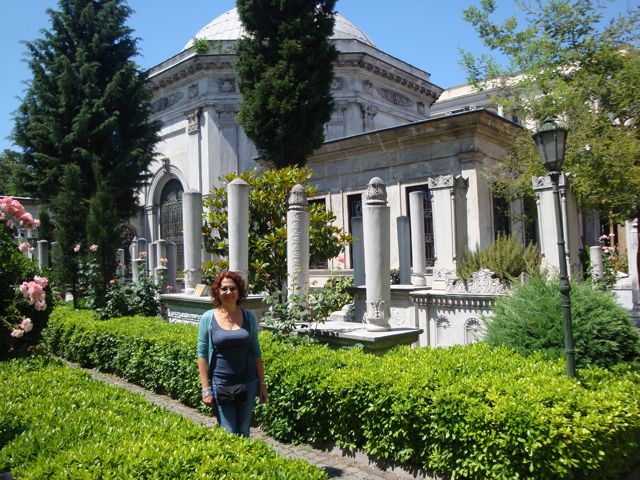 As we walked up Yenicerlier Cadessi, the street the tram runs on that changes names about ten times within a couple miles just to make people more confused about where they are, we came upon the beautiful cemetery of the Sultans where we were surprised to find tombs that were quite recent. It had never occurred to me that
like the Greek royal family, the Ottoman
family still exists. Following the Turkish Republic’s foundation, all members of Ottoman family were expelled from Turkey and settled in different parts of the world. At this point thinking about Sultans and Royalty we are reminded that we need to see if our Greek credit cards still worked, since there was a rumor that so many people in Greece were withdrawing their money in fear that Greece would return to the drachma that the banks were about to collapse. We found an ATM machine and tried our luck
and sure enough our request was denied.
I suppose you can't blame a Turkish bank for not wanting to give money to a Greek customer. It is not that they don't trust the customer but they are giving us their money with the expectation that our bank is going to give them the money back along with a small fee. But if they don't believe our bank will have the money to pay them then why should they give us the money we request? It is perfectly understandable. But when you are a tourist traveling in a far away country and you can't get money from the bank,
being understanding of the banks is not your first reaction. Your first reaction is a sense of panic. You know your bank is still in business and you know your money is in the bank and you know the ATM machine has money otherwise it would not have asked you if you wanted to make a withdrawal. So you try asking for a lesser amount. As we walked up Yenicerlier Cadessi, the street the tram runs on that changes names about ten times within a couple miles just to make people more confused about where they are, we came upon the beautiful cemetery of the Sultans where we were surprised to find tombs that were quite recent. It had never occurred to me that
like the Greek royal family, the Ottoman
family still exists. Following the Turkish Republic’s foundation, all members of Ottoman family were expelled from Turkey and settled in different parts of the world. At this point thinking about Sultans and Royalty we are reminded that we need to see if our Greek credit cards still worked, since there was a rumor that so many people in Greece were withdrawing their money in fear that Greece would return to the drachma that the banks were about to collapse. We found an ATM machine and tried our luck
and sure enough our request was denied.
I suppose you can't blame a Turkish bank for not wanting to give money to a Greek customer. It is not that they don't trust the customer but they are giving us their money with the expectation that our bank is going to give them the money back along with a small fee. But if they don't believe our bank will have the money to pay them then why should they give us the money we request? It is perfectly understandable. But when you are a tourist traveling in a far away country and you can't get money from the bank,
being understanding of the banks is not your first reaction. Your first reaction is a sense of panic. You know your bank is still in business and you know your money is in the bank and you know the ATM machine has money otherwise it would not have asked you if you wanted to make a withdrawal. So you try asking for a lesser amount.
|
|
Rejected again. It must be true. There is a run on the Greek banks and so they are not letting anyone have their money until it has been converted to drachma, just as we feared. The crisis now has a human face: Mine. But instead of panicking we are philosophical about it. We still have our American Express card. Most likely the guy selling mussels in front of the train station won't accept it but we can eat in fancy restaurants for the rest of our trip and get cash
advances and pay enormous interest like rich
people who don't care how much money they spend and even get miles on Delta for our next trip. Or we can beg on the street. Our hotel is paid for. How long would it take to get money for a kebab? Whatever extra we earn we can use so one of us can go to a museum. They say the Turks are generous people and there are hardly any beggars here so there is little competition. We can use the AMEX to buy a cheap guitar and I can play on the street just like I used to in Athens. Maybe I will be discovered and I won't have
to sit in front of a computer again. I cansee myself playing at a small Turkish club to an appreciative audience, not those uber-hip creepsters in Chapel Hill. Sensitive people and intellectuals who will respect the pain and suffering that has led me to the small hole-in-the-wall club with the cute blond bartender from Munich (who loves me for my songs, not my body), and shout out requests for my songs which they sing along to.
Andrea points to an HSBC ATM machine outside the Grand Bazaar. It accepts our card and gives us our money. So much for the collapse of Greece and my new career.
|
|
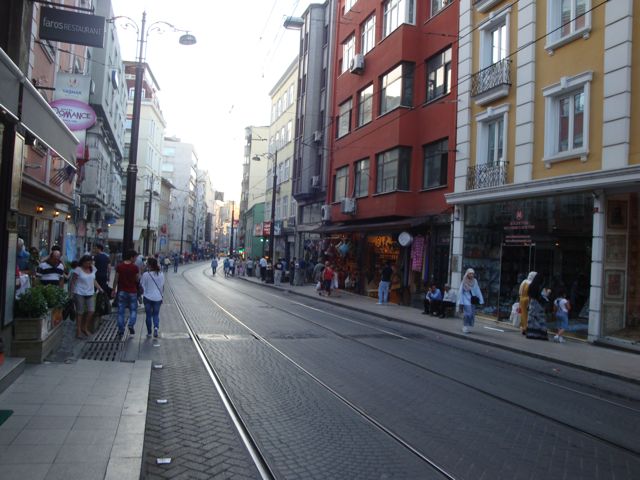 Amarandi has awakened at the hotel and sends an sms, which is the
only way we can stay in contact with our Greek cell phones because
they are pay-as-you-go card phones and cost only about fifty cents
a message compared to about a hundred euros a minute to talk. We
each have the very useful Istanbulkart which enables us to use all
the buses, trams, and ferries just by swiping it at the turnstyle,
but if I tell her to take the tram what if she misses the stop for
the Grand Bazaar at Beyazit and continues on to whatever strange
land is beyond the city walls and we never see her again. I think
in this situation it is better to just have her walk out the door
of the Hotel Neorion, turn right, walk a half a block to
Hudavendgar Cadessi, turn right and follow the tram tracks on foot
for twenty miles until she sees us. That way she can't miss us.
It's not really twenty miles. Maybe closer to two and surprisingly
she agrees to this plan and does not make us come back and get
her. It takes her about half an hour and when I see her walking up
the street she looks like a beautiful Turkish woman and from a
distance I am not sure if it is my daughter. But when I see the look on
her face that says "I can't f#$%ing believe you made me walk all
this way" I know it is her. Amarandi has awakened at the hotel and sends an sms, which is the
only way we can stay in contact with our Greek cell phones because
they are pay-as-you-go card phones and cost only about fifty cents
a message compared to about a hundred euros a minute to talk. We
each have the very useful Istanbulkart which enables us to use all
the buses, trams, and ferries just by swiping it at the turnstyle,
but if I tell her to take the tram what if she misses the stop for
the Grand Bazaar at Beyazit and continues on to whatever strange
land is beyond the city walls and we never see her again. I think
in this situation it is better to just have her walk out the door
of the Hotel Neorion, turn right, walk a half a block to
Hudavendgar Cadessi, turn right and follow the tram tracks on foot
for twenty miles until she sees us. That way she can't miss us.
It's not really twenty miles. Maybe closer to two and surprisingly
she agrees to this plan and does not make us come back and get
her. It takes her about half an hour and when I see her walking up
the street she looks like a beautiful Turkish woman and from a
distance I am not sure if it is my daughter. But when I see the look on
her face that says "I can't f#$%ing believe you made me walk all
this way" I know it is her.
|
|
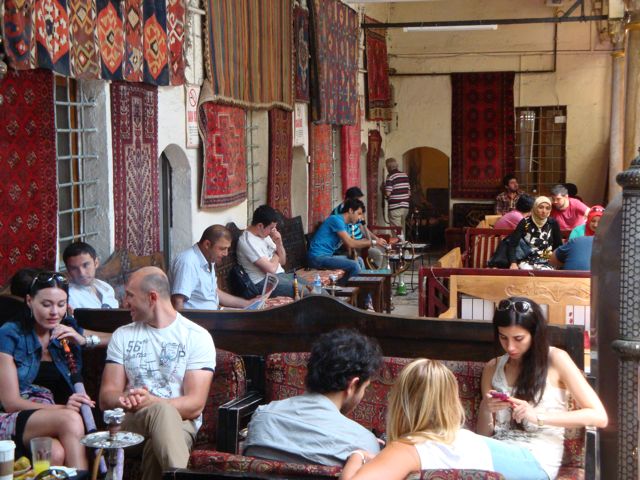 Andrea has gone into a covered market in
the Corlulu Alispasa Medresesi and discovered an amazing area of
traditional teahouses around a narghile shop which was supplying
them with waterpipes and hot coals. It looked pretty authentic but
the funny thing about Istanbul and being a westerner is that you
have to throw out some of the rules of tourism. Here's what I
mean. We are in this tea shop and there are people around us who
look Turkish and are speaking a language that is not English,
French, or German and they don't look Chinese so we assume they
are Turkish. But actually they could be tourists from Syria or
Jordan or Iran or anywhere in the middle east. If you are the kind
of traveler who comes to Istanbul and says that you only ate at
the restaurants that the Turks ate at how do you know? Did you go
to every table and ask if they were Turkish? As a westerner not
only do you not know what Turkish sounds like, you don't even know
what Turks look like because they all look different, just like
the Greeks. Our pal Cem has long red hair and is about six foot
seven. Our friend Hasim looks like Anderson Cooper. The beautiful
blond girl in the breakfast room at the hotel looks like she is
visiting from California with her surfer boyfriend. One of our waiters looked like Wally in
Leave It To Beaver and the masseuse at the hotel looks like the
lead guy in Metalica only younger and without tattoos. So in
Istanbul, particularly in the touristy areas, if someone looks
Turkish they probably are not. Even your waiter may be from Iraq
or Iran or Cyprus or he may be Kurdish.
In
one cafe three well dressed gentlemen came in who I assumed were
Turkish and spoke English to the waiter and then discovered that
they were all from Iran, the waiter too. And the young people out
at night in Beyoglu look like young people from everywhere and
separating the locals from the visitors by appearance would be an
impossible task. So really, don't know what Turks look like. You just think you do. Andrea has gone into a covered market in
the Corlulu Alispasa Medresesi and discovered an amazing area of
traditional teahouses around a narghile shop which was supplying
them with waterpipes and hot coals. It looked pretty authentic but
the funny thing about Istanbul and being a westerner is that you
have to throw out some of the rules of tourism. Here's what I
mean. We are in this tea shop and there are people around us who
look Turkish and are speaking a language that is not English,
French, or German and they don't look Chinese so we assume they
are Turkish. But actually they could be tourists from Syria or
Jordan or Iran or anywhere in the middle east. If you are the kind
of traveler who comes to Istanbul and says that you only ate at
the restaurants that the Turks ate at how do you know? Did you go
to every table and ask if they were Turkish? As a westerner not
only do you not know what Turkish sounds like, you don't even know
what Turks look like because they all look different, just like
the Greeks. Our pal Cem has long red hair and is about six foot
seven. Our friend Hasim looks like Anderson Cooper. The beautiful
blond girl in the breakfast room at the hotel looks like she is
visiting from California with her surfer boyfriend. One of our waiters looked like Wally in
Leave It To Beaver and the masseuse at the hotel looks like the
lead guy in Metalica only younger and without tattoos. So in
Istanbul, particularly in the touristy areas, if someone looks
Turkish they probably are not. Even your waiter may be from Iraq
or Iran or Cyprus or he may be Kurdish.
In
one cafe three well dressed gentlemen came in who I assumed were
Turkish and spoke English to the waiter and then discovered that
they were all from Iran, the waiter too. And the young people out
at night in Beyoglu look like young people from everywhere and
separating the locals from the visitors by appearance would be an
impossible task. So really, don't know what Turks look like. You just think you do.
|
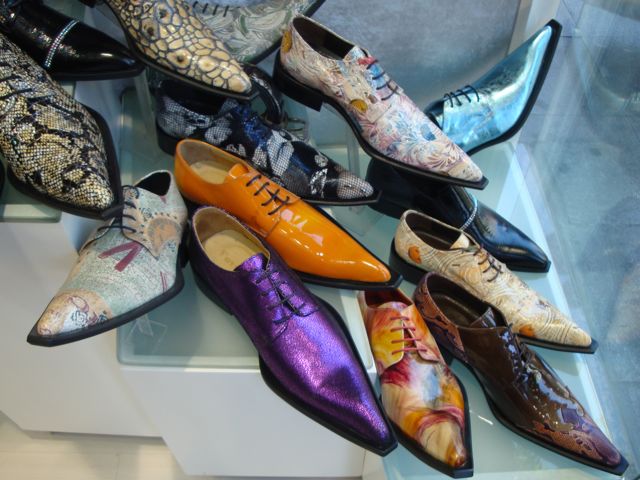 As we walked back towards Sultanhamet Square we passed a show
store with the most amazing shoes I had ever seen. None that I
would ever wear of course but certainly shoes that I could take
great pleasure in photographing and posting on Facebook as typical
Turkish footwear. It is a small shop, pretty nondescript until you
take a closer look at the shoes in the window which are the
pointiest and most outrageously designed that I have ever seen and
I can only assume that any actor or rock star from LA who has
visited Istanbul must have at least one pair of them. The shop is
called Ferudun Footwear and is between the Grand Bazaar and
Sultanahmet Square at Yeniceriler Cadessi 17 which is the same
street as Divan Yolu Cadessi(it changes names several times even
though it is the same street, the one the tram goes on). They have
a website at http://ferudunkundura.com but it only has two shoes
on it whether you go to the English version or the Turkish
version. Very nice design though. At this point we could have
continued on to the major sites but it being Sunday we assumed
that this is what most people would be doing today and going
anywhere would mean standing in line. But my excellent sense of
direction told me that if we walked down the hill towards the
patch of blue we would come to the sea, and on a hot day in
Istanbul the sea is where you want to be. As we walked back towards Sultanhamet Square we passed a show
store with the most amazing shoes I had ever seen. None that I
would ever wear of course but certainly shoes that I could take
great pleasure in photographing and posting on Facebook as typical
Turkish footwear. It is a small shop, pretty nondescript until you
take a closer look at the shoes in the window which are the
pointiest and most outrageously designed that I have ever seen and
I can only assume that any actor or rock star from LA who has
visited Istanbul must have at least one pair of them. The shop is
called Ferudun Footwear and is between the Grand Bazaar and
Sultanahmet Square at Yeniceriler Cadessi 17 which is the same
street as Divan Yolu Cadessi(it changes names several times even
though it is the same street, the one the tram goes on). They have
a website at http://ferudunkundura.com but it only has two shoes
on it whether you go to the English version or the Turkish
version. Very nice design though. At this point we could have
continued on to the major sites but it being Sunday we assumed
that this is what most people would be doing today and going
anywhere would mean standing in line. But my excellent sense of
direction told me that if we walked down the hill towards the
patch of blue we would come to the sea, and on a hot day in
Istanbul the sea is where you want to be.
|
|
 However since we had our totally outdated Lonely Planet in the
hotel room and were at the beginning of a long day of walking, we
left without buying anything, telling the girl at the desk that we
would return. We didn't. But we meant to. That is one of the
problems with Istanbul. There are too many places that you stop in
and want to spend more time in but you can't because your time is
so limited. You would have to spend a couple weeks here just to
see the important historical and cultural sites and most people
have to cram them into three or four days. Of course you can take
the attitude that if you see one mosque you have seen them all and
then once you have visited the Blue Mosque, you can cross the
other 2,994 mosques off of your things-to-do list which will open
up a lot of time for you. Or limit yourself to two museums instead
of the forty or more scattered around the city. Or you can tell
yourself that you will only spend a couple hours at the Grand
Bazaar instead of spending all day there, and the next, and the
next, exploring the thousands of shops and exhausting your (or
your parents) credit card. The point is you should probably accept
that if you go into an interesting store like the Book Shop, or
Robinson Crusoe, or any of the thousands of unique shops that you
will find all over the city and you see something you want and you
tell yourself that you will come back later and buy it, my advice
is to buy it now. You will find that there is so much to see and
do that you won't come back to the shop. You may be too exhausted
or going back may mean missing something else. I am not trying to
save the Turkish economy. It does not appear to need saving. But
if you really, really want something then buy it. Unless it is
right next to your hotel you probably won't come back to get it
later and then you will end up like me, trying to remember the
title of the interesting old book about Istanbul that I saw so I
can find it on Amazon. OK. Books may not be such a problem. You
can find lots of John Freely on Amazon. But try buying pastourma
on line.
However since we had our totally outdated Lonely Planet in the
hotel room and were at the beginning of a long day of walking, we
left without buying anything, telling the girl at the desk that we
would return. We didn't. But we meant to. That is one of the
problems with Istanbul. There are too many places that you stop in
and want to spend more time in but you can't because your time is
so limited. You would have to spend a couple weeks here just to
see the important historical and cultural sites and most people
have to cram them into three or four days. Of course you can take
the attitude that if you see one mosque you have seen them all and
then once you have visited the Blue Mosque, you can cross the
other 2,994 mosques off of your things-to-do list which will open
up a lot of time for you. Or limit yourself to two museums instead
of the forty or more scattered around the city. Or you can tell
yourself that you will only spend a couple hours at the Grand
Bazaar instead of spending all day there, and the next, and the
next, exploring the thousands of shops and exhausting your (or
your parents) credit card. The point is you should probably accept
that if you go into an interesting store like the Book Shop, or
Robinson Crusoe, or any of the thousands of unique shops that you
will find all over the city and you see something you want and you
tell yourself that you will come back later and buy it, my advice
is to buy it now. You will find that there is so much to see and
do that you won't come back to the shop. You may be too exhausted
or going back may mean missing something else. I am not trying to
save the Turkish economy. It does not appear to need saving. But
if you really, really want something then buy it. Unless it is
right next to your hotel you probably won't come back to get it
later and then you will end up like me, trying to remember the
title of the interesting old book about Istanbul that I saw so I
can find it on Amazon. OK. Books may not be such a problem. You
can find lots of John Freely on Amazon. But try buying pastourma
on line. As we walked back towards Sultanhamet Square we passed a show
store with the most amazing shoes I had ever seen. None that I
would ever wear of course but certainly shoes that I could take
great pleasure in photographing and posting on Facebook as typical
Turkish footwear. It is a small shop, pretty nondescript until you
take a closer look at the shoes in the window which are the
pointiest and most outrageously designed that I have ever seen and
I can only assume that any actor or rock star from LA who has
visited Istanbul must have at least one pair of them. The shop is
called Ferudun Footwear and is between the Grand Bazaar and
Sultanahmet Square at Yeniceriler Cadessi 17 which is the same
street as Divan Yolu Cadessi(it changes names several times even
though it is the same street, the one the tram goes on). They have
a website at http://ferudunkundura.com but it only has two shoes
on it whether you go to the English version or the Turkish
version. Very nice design though. At this point we could have
continued on to the major sites but it being Sunday we assumed
that this is what most people would be doing today and going
anywhere would mean standing in line. But my excellent sense of
direction told me that if we walked down the hill towards the
patch of blue we would come to the sea, and on a hot day in
Istanbul the sea is where you want to be.
As we walked back towards Sultanhamet Square we passed a show
store with the most amazing shoes I had ever seen. None that I
would ever wear of course but certainly shoes that I could take
great pleasure in photographing and posting on Facebook as typical
Turkish footwear. It is a small shop, pretty nondescript until you
take a closer look at the shoes in the window which are the
pointiest and most outrageously designed that I have ever seen and
I can only assume that any actor or rock star from LA who has
visited Istanbul must have at least one pair of them. The shop is
called Ferudun Footwear and is between the Grand Bazaar and
Sultanahmet Square at Yeniceriler Cadessi 17 which is the same
street as Divan Yolu Cadessi(it changes names several times even
though it is the same street, the one the tram goes on). They have
a website at http://ferudunkundura.com but it only has two shoes
on it whether you go to the English version or the Turkish
version. Very nice design though. At this point we could have
continued on to the major sites but it being Sunday we assumed
that this is what most people would be doing today and going
anywhere would mean standing in line. But my excellent sense of
direction told me that if we walked down the hill towards the
patch of blue we would come to the sea, and on a hot day in
Istanbul the sea is where you want to be.
 Sunday morning is a great time to walk around
Istanbul because everyone who has a car is probably asleep and the
usually crowded streets are empty. This past Sunday Andrea and I woke up early and
had breakfast and coffee at the
Sunday morning is a great time to walk around
Istanbul because everyone who has a car is probably asleep and the
usually crowded streets are empty. This past Sunday Andrea and I woke up early and
had breakfast and coffee at the  Just beyond the Firuz Aga Mosque and the German Fountain
there are a couple good English language bookshops owned by the
same people, one on each side of the street to make sure nobody
misses them. They are hard to miss since they have given
themselves the generic name of BOOK SHOP and they have a large
glass window displaying books. Though their stock was redundant,
you would see the same books in differents sections of the store,
their collection of Turkish travel guides, Turkish art books,
books by Turkish writers and foreigners living in Turkey like John
Freely was excellent. Freely who apparently visits the shop has called it "the most elegant bookshop I have ever
seen". Of course if you are coming from the USA,
particularly a university town, you won't be that impressed by its
elegance. It just looks like a really nice bookshop. But unlike
Robinson Crusoe Bookshop on Istikial Avenue in Beyoglu which is
the classic book lover's bookshop with shelves packed full of
books, that reach the ceiling, crammed into a very small
space,(really similar to Sheakespeare and Sons in Paris) the Book Shop has a generous amount of room and you are not overwhelmed by
the task of reading every title on the binder until you find one
you like. Books are sensibly displayed face forward and the whole
place feels comfortable. There are comfortable chairs and you can
browse and hang out all day if you like, at least that is what the
owners say. They also hope to expand to London, New York and Paris
and to be a window on Turkey for the rest of the world. But if you
come to Turkey and need a guidebook or want to read the latest
Orhan Pamuk or some of the other Turkish writers, current or
historical, or any books on Turkish history, culture or even a
Turkish phrase book, this is a good place to visit at the
beginning of your trip and also at the end. They have a website at
Just beyond the Firuz Aga Mosque and the German Fountain
there are a couple good English language bookshops owned by the
same people, one on each side of the street to make sure nobody
misses them. They are hard to miss since they have given
themselves the generic name of BOOK SHOP and they have a large
glass window displaying books. Though their stock was redundant,
you would see the same books in differents sections of the store,
their collection of Turkish travel guides, Turkish art books,
books by Turkish writers and foreigners living in Turkey like John
Freely was excellent. Freely who apparently visits the shop has called it "the most elegant bookshop I have ever
seen". Of course if you are coming from the USA,
particularly a university town, you won't be that impressed by its
elegance. It just looks like a really nice bookshop. But unlike
Robinson Crusoe Bookshop on Istikial Avenue in Beyoglu which is
the classic book lover's bookshop with shelves packed full of
books, that reach the ceiling, crammed into a very small
space,(really similar to Sheakespeare and Sons in Paris) the Book Shop has a generous amount of room and you are not overwhelmed by
the task of reading every title on the binder until you find one
you like. Books are sensibly displayed face forward and the whole
place feels comfortable. There are comfortable chairs and you can
browse and hang out all day if you like, at least that is what the
owners say. They also hope to expand to London, New York and Paris
and to be a window on Turkey for the rest of the world. But if you
come to Turkey and need a guidebook or want to read the latest
Orhan Pamuk or some of the other Turkish writers, current or
historical, or any books on Turkish history, culture or even a
Turkish phrase book, this is a good place to visit at the
beginning of your trip and also at the end. They have a website at
 As we walked up Yenicerlier Cadessi, the street the tram runs on that changes names about ten times within a couple miles just to make people more confused about where they are, we came upon the beautiful cemetery of the Sultans where we were surprised to find tombs that were quite recent. It had never occurred to me that
like the Greek royal family, the Ottoman
family still exists. Following the Turkish Republic’s foundation, all members of Ottoman family were expelled from Turkey and settled in different parts of the world. At this point thinking about Sultans and Royalty we are reminded that we need to see if our Greek credit cards still worked, since there was a rumor that so many people in Greece were withdrawing their money in fear that Greece would return to the drachma that the banks were about to collapse. We found an ATM machine and tried our luck
and sure enough our request was denied.
I suppose you can't blame a Turkish bank for not wanting to give money to a Greek customer. It is not that they don't trust the customer but they are giving us their money with the expectation that our bank is going to give them the money back along with a small fee. But if they don't believe our bank will have the money to pay them then why should they give us the money we request? It is perfectly understandable. But when you are a tourist traveling in a far away country and you can't get money from the bank,
being understanding of the banks is not your first reaction. Your first reaction is a sense of panic. You know your bank is still in business and you know your money is in the bank and you know the ATM machine has money otherwise it would not have asked you if you wanted to make a withdrawal. So you try asking for a lesser amount.
As we walked up Yenicerlier Cadessi, the street the tram runs on that changes names about ten times within a couple miles just to make people more confused about where they are, we came upon the beautiful cemetery of the Sultans where we were surprised to find tombs that were quite recent. It had never occurred to me that
like the Greek royal family, the Ottoman
family still exists. Following the Turkish Republic’s foundation, all members of Ottoman family were expelled from Turkey and settled in different parts of the world. At this point thinking about Sultans and Royalty we are reminded that we need to see if our Greek credit cards still worked, since there was a rumor that so many people in Greece were withdrawing their money in fear that Greece would return to the drachma that the banks were about to collapse. We found an ATM machine and tried our luck
and sure enough our request was denied.
I suppose you can't blame a Turkish bank for not wanting to give money to a Greek customer. It is not that they don't trust the customer but they are giving us their money with the expectation that our bank is going to give them the money back along with a small fee. But if they don't believe our bank will have the money to pay them then why should they give us the money we request? It is perfectly understandable. But when you are a tourist traveling in a far away country and you can't get money from the bank,
being understanding of the banks is not your first reaction. Your first reaction is a sense of panic. You know your bank is still in business and you know your money is in the bank and you know the ATM machine has money otherwise it would not have asked you if you wanted to make a withdrawal. So you try asking for a lesser amount. Amarandi has awakened at the hotel and sends an sms, which is the
only way we can stay in contact with our Greek cell phones because
they are pay-as-you-go card phones and cost only about fifty cents
a message compared to about a hundred euros a minute to talk. We
each have the very useful Istanbulkart which enables us to use all
the buses, trams, and ferries just by swiping it at the turnstyle,
but if I tell her to take the tram what if she misses the stop for
the Grand Bazaar at Beyazit and continues on to whatever strange
land is beyond the city walls and we never see her again. I think
in this situation it is better to just have her walk out the door
of the Hotel Neorion, turn right, walk a half a block to
Hudavendgar Cadessi, turn right and follow the tram tracks on foot
for twenty miles until she sees us. That way she can't miss us.
It's not really twenty miles. Maybe closer to two and surprisingly
she agrees to this plan and does not make us come back and get
her. It takes her about half an hour and when I see her walking up
the street she looks like a beautiful Turkish woman and from a
distance I am not sure if it is my daughter. But when I see the look on
her face that says "I can't f#$%ing believe you made me walk all
this way" I know it is her.
Amarandi has awakened at the hotel and sends an sms, which is the
only way we can stay in contact with our Greek cell phones because
they are pay-as-you-go card phones and cost only about fifty cents
a message compared to about a hundred euros a minute to talk. We
each have the very useful Istanbulkart which enables us to use all
the buses, trams, and ferries just by swiping it at the turnstyle,
but if I tell her to take the tram what if she misses the stop for
the Grand Bazaar at Beyazit and continues on to whatever strange
land is beyond the city walls and we never see her again. I think
in this situation it is better to just have her walk out the door
of the Hotel Neorion, turn right, walk a half a block to
Hudavendgar Cadessi, turn right and follow the tram tracks on foot
for twenty miles until she sees us. That way she can't miss us.
It's not really twenty miles. Maybe closer to two and surprisingly
she agrees to this plan and does not make us come back and get
her. It takes her about half an hour and when I see her walking up
the street she looks like a beautiful Turkish woman and from a
distance I am not sure if it is my daughter. But when I see the look on
her face that says "I can't f#$%ing believe you made me walk all
this way" I know it is her.  Andrea has gone into a covered market in
the Corlulu Alispasa Medresesi and discovered an amazing area of
traditional teahouses around a narghile shop which was supplying
them with waterpipes and hot coals. It looked pretty authentic but
the funny thing about Istanbul and being a westerner is that you
have to throw out some of the rules of tourism. Here's what I
mean. We are in this tea shop and there are people around us who
look Turkish and are speaking a language that is not English,
French, or German and they don't look Chinese so we assume they
are Turkish. But actually they could be tourists from Syria or
Jordan or Iran or anywhere in the middle east. If you are the kind
of traveler who comes to Istanbul and says that you only ate at
the restaurants that the Turks ate at how do you know? Did you go
to every table and ask if they were Turkish? As a westerner not
only do you not know what Turkish sounds like, you don't even know
what Turks look like because they all look different, just like
the Greeks. Our pal Cem has long red hair and is about six foot
seven. Our friend Hasim looks like Anderson Cooper. The beautiful
blond girl in the breakfast room at the hotel looks like she is
visiting from California with her surfer boyfriend. One of our waiters looked like Wally in
Leave It To Beaver and the masseuse at the hotel looks like the
lead guy in Metalica only younger and without tattoos. So in
Istanbul, particularly in the touristy areas, if someone looks
Turkish they probably are not. Even your waiter may be from Iraq
or Iran or Cyprus or he may be Kurdish.
In
one cafe three well dressed gentlemen came in who I assumed were
Turkish and spoke English to the waiter and then discovered that
they were all from Iran, the waiter too. And the young people out
at night in Beyoglu look like young people from everywhere and
separating the locals from the visitors by appearance would be an
impossible task. So really, don't know what Turks look like. You just think you do.
Andrea has gone into a covered market in
the Corlulu Alispasa Medresesi and discovered an amazing area of
traditional teahouses around a narghile shop which was supplying
them with waterpipes and hot coals. It looked pretty authentic but
the funny thing about Istanbul and being a westerner is that you
have to throw out some of the rules of tourism. Here's what I
mean. We are in this tea shop and there are people around us who
look Turkish and are speaking a language that is not English,
French, or German and they don't look Chinese so we assume they
are Turkish. But actually they could be tourists from Syria or
Jordan or Iran or anywhere in the middle east. If you are the kind
of traveler who comes to Istanbul and says that you only ate at
the restaurants that the Turks ate at how do you know? Did you go
to every table and ask if they were Turkish? As a westerner not
only do you not know what Turkish sounds like, you don't even know
what Turks look like because they all look different, just like
the Greeks. Our pal Cem has long red hair and is about six foot
seven. Our friend Hasim looks like Anderson Cooper. The beautiful
blond girl in the breakfast room at the hotel looks like she is
visiting from California with her surfer boyfriend. One of our waiters looked like Wally in
Leave It To Beaver and the masseuse at the hotel looks like the
lead guy in Metalica only younger and without tattoos. So in
Istanbul, particularly in the touristy areas, if someone looks
Turkish they probably are not. Even your waiter may be from Iraq
or Iran or Cyprus or he may be Kurdish.
In
one cafe three well dressed gentlemen came in who I assumed were
Turkish and spoke English to the waiter and then discovered that
they were all from Iran, the waiter too. And the young people out
at night in Beyoglu look like young people from everywhere and
separating the locals from the visitors by appearance would be an
impossible task. So really, don't know what Turks look like. You just think you do. 